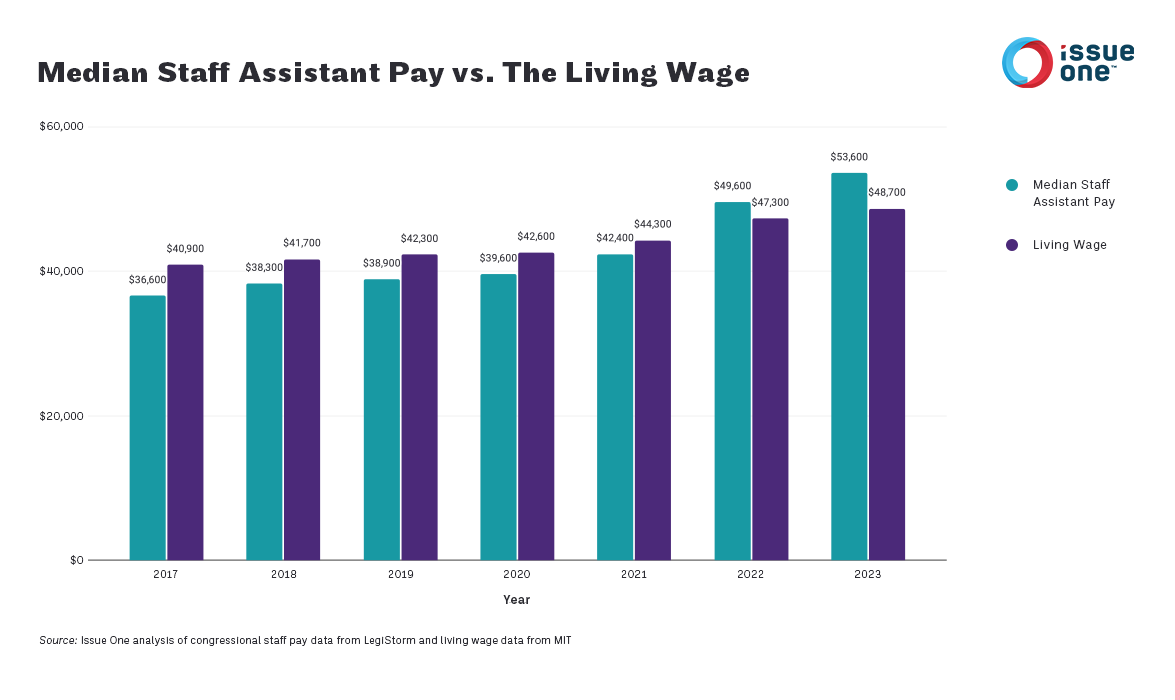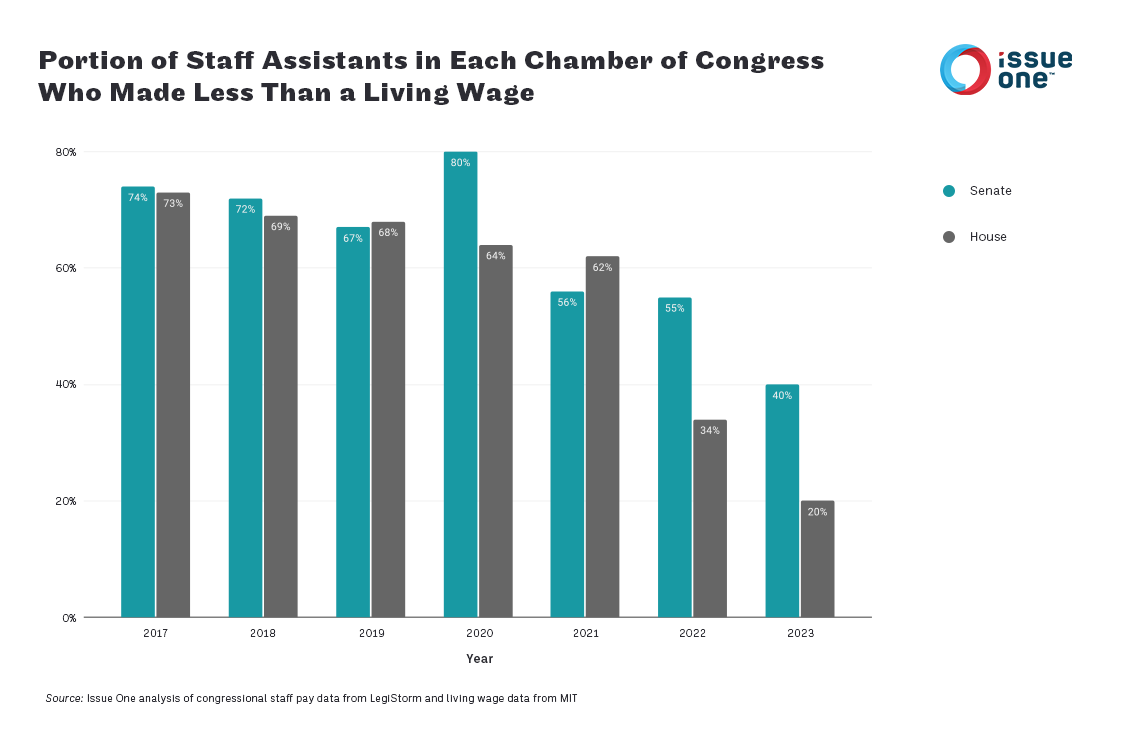Press releases
After policy changes, junior-level congressional staffers earn more, Issue One analysis shows
Typical staff assistant on Capitol Hill no longer makes less than a living wage, but more reforms are needed to attract and retain staffers from all socioeconomic backgrounds
Media Contact
Georgia Lyon
Interim Senior Communications Manager
 Photo: Tim Mossholder/Unsplash
Photo: Tim Mossholder/Unsplash
New research by Issue One shows that the salaries of the lowest-paid staffers on Capitol Hill have been improving in recent years. This is thanks, at least in part, to the $45,000 pay floor that was established in the House of Representatives in September 2022.
A new Issue One analysis of congressional salary data from LegiStorm found that the share of D.C.-based staff assistants making less than a living wage was cut in half between 2021 and 2023 — though this progress has been uneven across the two chambers of Congress and economic hardships remain very real for too many congressional staffers.
“Taxpayers deserve the best service from their government and their representatives in Congress,” said Amb. Tim Roemer (D-IN), co-chair of Issue One’s ReFormers Caucus. “Paying congressional staffers a fair wage and attracting the best and brightest to public service is key. This report strongly makes the case for great public servants, efficient work, and equitable pay.”
Added Rep. Barbara Comstock (R-VA), a member of Issue One’s ReFormers Caucus and herself a former congressional staffer: “As encouraging as the improvements reflected in this report are, we must not rest on our laurels. Increased investments in congressional staff pay and retention initiatives should be prioritized in the appropriations process. For Congress to best serve the country, Americans from all socioeconomic backgrounds must have opportunities to help the legislative branch of our government function.”
Continued Joshua Bonet, a legislative associate at Issue One: “For our democracy to succeed, diverse perspectives and backgrounds must be reflected in the institutions that shape the nation’s laws. Fair salaries are a critical step in ensuring that Congress can be a place where staffers are as diverse as the country itself.”
A previous Issue One analysis published in January 2022 revealed that roughly 13% of congressional staffers made less than a living wage in 2020, including 70% of staff assistants.
Issue One’s new analysis shows that just 4.6% of congressional staffers made less than a living wage in 2023, including just 28% of staff assistants.
Issue One’s new research further shows that the typical staff assistant on Capitol Hill now makes more than a living wage, having earned about $53,600 in 2023, or about $5,000 more than the annual living wage in the nation’s capital.

More of this wage growth has been felt in the House of Representatives than in the Senate. In 2021, the year before the House instituted a pay floor, roughly the same portion of D.C.-based House and Senate staffers made less than a living wage — 11%. In 2023, 7.6% of Senate staffers still made below a living wage, but that was true for just 2.8% of House staffers.

Despite these improvements, many staff assistants are still struggling, and staff assistants in the House are typically faring better than their counterparts in the Senate.
Issue One’s new research shows that the typical House staff assistant made roughly $4,500 more per year in 2023 than the typical Senate staff assistant, about $55,200 versus $50,700. Moreover, Issue One found that 40% of Senate staff assistants still made less than a living wage in 2023, compared to 20% of House staff assistants.
Researchers at the Massachusetts Institute of Technology (MIT) describe a living wage as a “minimum subsistence wage” that should cover one’s basic needs such as housing, food, transportation, and medical expenses. Such a basic salary does not allow for discretionary spending on things such as meals at restaurants, vacations, or saving for retirement. MIT researchers estimated the living wage in 2023 was about $48,700 for a single adult with no children in Washington, D.C. That number is about $49,700 today.
To help Congress continue to improve staff pay and retention, this new Issue One report — entitled “The Road to Fair Pay” — calls for the adoption of the following seven measures:
- Institute a livable pay floor for full-time workers in the Senate
- Index pay floors in the House and Senate to inflation
- Issue paychecks to House staffers at least twice a month, instead of monthly
- Pay all congressional interns
- Support professional development initiatives for staffers
- Additional investments in lawmakers’ office budgets should be made as congressional leaders debate spending levels for the next fiscal year
- Members of Congress should spend their official budgets in a manner that both enhances staff pay and increases the overall effectiveness of their offices
